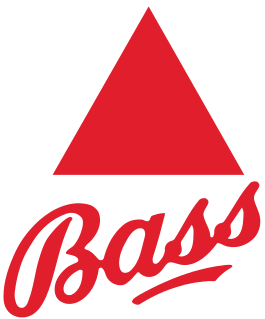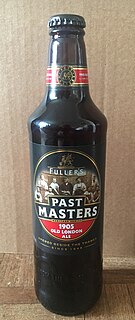
Marston's is a British brewery, pub and hotel operator. It operates 1,568 pubs in the UK, and is the world's largest brewer of cask ale. 80 per cent of profits come from the pubs division. It was known as Wolverhampton and Dudley Breweries plc until 2007 when it rebranded as Marston's.

India pale ale (IPA) is a hoppy beer style within the broader category of pale ale.

The Bass Brewery was founded in 1777 by William Bass in Burton-upon-Trent, England. The main brand was Bass Pale Ale, once the highest-selling beer in the UK. By 1877, Bass had become the largest brewery in the world, with an annual output of one million barrels. Its pale ale was exported throughout the British Empire, and the company's distinctive red triangle became the UK's first registered trade mark.

The Worthington Brewery, also known as Worthington & Co. and Worthington's, was founded by William Worthington in the English Midlands town of Burton upon Trent in 1761. It is the second oldest continuously brewed British beer brand after Whitbread. The best known Worthington beers are the Creamflow nitrokeg bitter and White Shield India Pale Ale.

Michael Arthur Bass, 1st Baron Burton KCVO, known as Sir Michael Arthur Bass, 1st Baronet, from 1882-86, was a British brewer, Liberal politician and philanthropist. He sat in the House of Commons from 1865-1886 when he was raised to the peerage as Baron Burton.

Charrington Brewery was a brewery company founded in Bethnal Green, London in the early 18th century by Robert Westfield. In 1766, John Charrington joined the company, which then traded as Westfield, Moss & Charrington from the Anchor Brewery in Mile End. It merged with United Breweries of London in 1964 to become Charrington United Breweries, then, after acquiring a number of other breweries, it merged with Bass Brewery in 1967 to become the largest UK brewing company, Bass Charrington, later simply Bass plc. The brewing operations of the company were bought by Interbrew in 2000, while the retail side were renamed Six Continents. In 2003 Six Continents split into a pubs business, now known as Mitchells & Butlers, and a hotels and soft drinks business, now known as InterContinental Hotels Group.

Michael Thomas Bass, DL was an English brewer and a member of Parliament. Under his leadership, the Bass Brewery became the largest brewery in the world, and Bass the best known brand of beer in England. Bass represented Derby in the House of Commons as a member of the Liberal Party between 1848 and 1883 where he was an effective advocate for the brewing industry. He was a generous benefactor both in Derby, and in Burton-on-Trent where his company was based.
Michael Thomas Bass was a brewer of Burton-on-Trent, England, who considerably developed the Bass brewing company.
Henry Wardle was a British brewer and Liberal politician who sat in the House of Commons from 1885 to 1892.
Burton upon Trent has a long history of brewing, at one time exporting beer throughout the world and accounting for a quarter of UK beer production; emulation of Burton water in brewing is called Burtonisation. Much of the town was given over to the industry throughout the 19th century and brewers dominated it politically and socially.
George Hayne was a merchant and entrepreneur who was responsible for the creation of the Trent Navigation in England and hence the development of Burton upon Trent as the pre-eminent beer brewing and exporting town.

Stones Brewery was a brewery founded in 1868 by William Stones in Sheffield, West Riding of Yorkshire, England, and purchased by Bass Brewery in 1968. After its closure in 1999, its major brand, Stones Bitter, has continued to be produced by the Molson Coors Brewing Company.
James Eadie (1827–1904) was a Scottish brewer who founded an eponymous brewery in Burton on Trent which operated for 90 years.
William Bass was the founder of the Bass Brewery.
Coors Brewers Limited, later known as Molson Coors Brewing Company (UK) Limited is the UK arm of Molson Coors Brewing Company. Its headquarters is in Burton upon Trent, Staffordshire. The company originates from Bass Brewers Limited. The company has gone through many name changes and mergers.
Thornewill and Warham Ltd was a metal hardware and industrial metalwork manufacturer, later an engineering company, based in Burton upon Trent, Staffordshire, England. Under different names it traded from 1740 until 1929, becoming a notable producer of steam engines and railway locomotives. It also constructed two footbridges across the River Trent in Burton.

Burton Ale is a type of strong ale which has been described as "a draught beer darker and sweeter than bitter, named originally after the great brewing town of Burton-on-Trent but now common to all breweries wherever they are". The Beer Judge Certification Program has defined a style guideline for Burton Ale, which it describes as "A rich, malty, sweet, and bitter dark ale of moderately strong alcohol. Full bodied and chewy with a balanced hoppy finish and complex malty and hoppy aroma. Fruity notes accentuate the malt richness, while the hops help balance the sweeter finish." The guideline lists the characteristic ingredients as "bready and biscuity English base malts with a substantial portion of 'high kilned' malt: historical versions often used brewing sugars and corn, more modern versions can use crystal malts for flavour and chocolate malt for color; English ale yeast; traditional English hops, often dry hopped."










